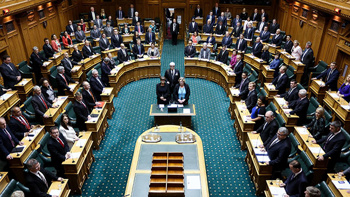National house prices rose less than 1 per cent from May to June and sales volumes dropped 5 per cent.
Real Estate Institute data showed May's median prices of $817,500 rose only to $820,000 in June, up just 0.3 per cent.
Turnover fell from 7720 sales nationally in May to 7345 sales last month.
Auckland's median rose only 0.2 per cent, from $1.14m to $1.15m and sales volumes also fell 2.4 per cent from 2834 to 2766.
Westpac economists have been forecasting house prices to flatten off this year, as a result of the changes to the tax treatment of property investors.
New inflation figures are due out on Friday and are expected to show prices rising at their fastest pace in a decade.
Michael Gordon, Westpac's acting chief economist, said today's data "showed that the New Zealand housing market remains strong, but is cooling off relative to its white-hot pace at the start of this year. Sales were broadly flat, while prices rose at a slower pace than in previous months.
"We estimate that June sales were down about 1 per cent in seasonally adjusted terms. Given the usual undercount on the first reading, that suggests they were probably flat for the month. Sales are still running above pre-Covid levels, and indeed they were still higher than in June last year, which marked the start of the post-lockdown rebound in activity," Gordon said.
The return of loan-to-value restrictions and the recent tax changes have contributed to some cooling-off of demand for investment properties, although the evidence to date suggests that homebuyers have been quite willing to step into the breach, he said.
"That could change once mortgage rates – in particular the popular one- and two-year fixed rates – start to rise from their lows, as the prospect of OCR hikes comes onto the horizon," Gordon said.
Miles Workman, an ANZ senior economist, said: :At first blush, today's release suggests the data are settling down following recent policy announcements, and it's becoming increasingly apparent that a severe lack of inventory is keeping the market tight and prices elevated."
REINZ stressed annual rather than monthly figures in the commentary out with today's data.
But bank economists reacting to today's data will look at it month-on-month to see what signs of change are occurring.
Jen Baird, REINZ chief executive, said median prices increased by 28.7 per cent from $637,000 in June 2020 to $820,000 last month.
"Additionally, five out of 16 regions reached new record median prices, one region saw an equal record and 20 districts reached new record median highs," Baird said.
The median house price for New Zealand excluding Auckland increased by 25.9 per cent from $540,000 in June last year to $680,000 last month.
Auckland's median house price increased by 25 per cent from $920,000 in June 2020 to $1,150,000 last month, another new record for Auckland.
The Reserve Bank says long-term interest rates have been trending down for decades, and the global monetary policy response to the Covid-19 pandemic brought them even lower.
"However, this doesn't mean that the trend won't reverse. A disorderly unwinding
of monetary policy support could see abrupt adjustments in asset prices, posing a
particular risk to those who have purchased at the current elevated levels," it says.
Mortgage borrowers, particularly those who entered the market recently, are vulnerable to a rise in interest rates. The Reserve Bank estimates suggest that for a typical recent owner-occupier borrower, an increase in the one-year mortgage rate to 5 per cent would increase their debt servicing ratio from under 30 per cent currently to nearly 50 per cent.
"Investors are expected to show a larger debt servicing ratio increase to interest rate rises, although on average they have higher incomes to deal with the shock and can raise rents
in response," the Reserve Bank says.
But Baird said "even the month-on-month data has shown a slight uplift". That suggested, she said, "that the market is refusing to cool".
Take your Radio, Podcasts and Music with you









